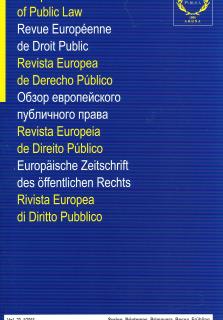
L’état et la science du droit public aujourd’hui:
Le temps du rétablissement de la confiance, le temps des explications
(The State and the Science of Public Law Today:
A Time to Re-establish Confidence, A time for Explanations)
The study of concepts and methods of Public Law nowadays requires reflection on the role of the science of Public Law in the context of the current economic crisis, whose singularity leads us to form two important questions on its agenda: the function of the restoration of confidence and the role of institutions in the credibility of the system. The centrality of these questions permits us to refer to a time for explanations. Public action nowadays remains marked by some elements deriving from the reaction of organisations such as the OECD, the World Bank, the G-20, the IMF or the EU Commission. These elements concern the dimension of the task of public powers, their principles of organisation and of action for confidence, the time, scope and continuity of public action in the framework of an aspiration towards the global regulation. In this context of new realities and of changing realities and perceptions, responsibility for a critical explanation, analysis and adaptation of explicative capacities of old and new concepts belongs to the science of Public Law. This concerns especially the elements related to the credibility of public action and to the relations between the administration and politics in the context of global spaces of decision.
L’étude des concepts et des méthodes en Droit Public aujourd’hui exige une réflexion sur le rôle de la science du Droit Public dans le contexte de la crise économique actuelle, dont la singularité nous mène à établir deux grandes questions dans son agenda: la fonction du rétablissement de la confiance et le rôle des institutions dans la crédibilité du système. La centralité de ces questions-là nous permet de parler du temps des explications. L’action publique aujourd’hui reste marquée par quelques éléments dérivés de la réaction d’organisations comme l’OCDE, la Banque mondiale, le G20, le FMI ou la Commission de l’UE. Ces éléments concernent la dimension de la tâche des pouvoirs publics, leurs principes d’organisation et d’action pour la confiance, les temps, la portée et la suite de l’action publique dans le cadre d’une aspiration à la régulation globale. Dans ce contexte de réalités nouvelles et de réalités et perceptions qui changent, il appartient à la science du Droit Public la responsabilité d’explication critique, d’analyse et d’adaptation des capacités explicatives des vieux et des nouveaux concepts. Cela concerne notamment les éléments relatifs à la crédibilité de l’action publique et aux rapports entre l’administration et la politique dans le contexte des espaces globaux de décision.





















